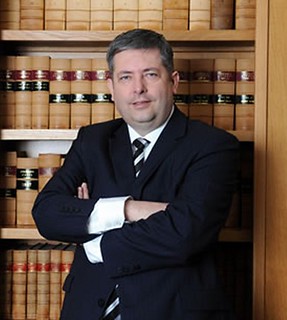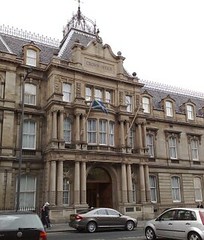 Evidence emerges of a secret slush fund at Lord Advocate’s Crown Office. SCOTLAND’S Crown Office & Procurator Fiscal Service (COPFS) has today been accused of operating a secret, unaudited “slush fund of public money” used to pay for legal advice, and private legal representation for its own members of staff who have been charged with criminal offences or who have become involved in civil legal disputes.
Evidence emerges of a secret slush fund at Lord Advocate’s Crown Office. SCOTLAND’S Crown Office & Procurator Fiscal Service (COPFS) has today been accused of operating a secret, unaudited “slush fund of public money” used to pay for legal advice, and private legal representation for its own members of staff who have been charged with criminal offences or who have become involved in civil legal disputes.
The fund, which legal insiders claim is buried deep in the budget for the Crown Office, is rumoured to have paid out millions of pounds over its existence in cases involving its own staff. There are also suggestions the fund has been used to PAY-OFF ‘media friendly’ law firms to keep headlines involving criminal charges against COPFS staff out of the press and that the fund may have been used “to purchase testimony” from witnesses”.
The claims come after the Crown Office refused to respond to Freedom of Information requests made by journalists investigating leaks that “a substantial fund which is not subject to external audit or accountability”, is maintained by prosecutors to pay huge sums relating to legal costs of their colleagues caught up in scandals, criminal charges and civil legal actions.
Legal insiders claim the fund, which is bankrolled by the Scottish Government, has been operating on an almost “cash-in-hand basis” with several high profile law firms receiving large sums of money for representing Crown Office personnel up to the most senior rank in the organisation.
Documents passed to Scottish Law Reporter show that journalists used FOI laws in June of this year to ask COPFS officials “Are there any arrangements for former Crown Office staff to continue to receive payment of public funds, respective legal advice, action or representation of issues or cases in which they were personally involved in prior to leaving COPFS, and if so, how many such cases have occurred since 2009, how many continue to this date, and how much has been paid in relation to the cases.”
It then took the Crown Office OVER TWO MONTHS to reply, after a series of secret internal discussions concluded the information should not be handed over, out of fears it would reveal significant sums of public money had been handed over by the Lord Advocate’s staff to law firms without any accounting of fees or questions as to the level of charges, which in some cases have skyrocketed past six figure sums.
Gertie Wallace, of the Crown Office ‘Policy Division’ replied to journalists, applying exemptions under Section 35(1)(b) and 35(1)(c) of FOISA to all of the information requested. Gertie Wallace then went onto state : “I consider that the release of the information would substantially prejudice the apprehension and prosecution of offenders and the administration of justice.”
“I am satisfied that in all the circumstances there are compelling reasons that the public interest in disclosing is not outweighed by the public interest in not disclosing the information. I consider the public interest is best served by applying the exemptions under section 35(1) (b) and (c) in this particular instance. “
The Crown Office also refused to disclose the detailed reasons for refusing to disclose the information, citing live criminal proceedings against its own staff.
Wallace went onto say : “I cannot provide you with the detailed reason for this decision because to do so would in itself disclose information which is exempt under this section and also under section 26(c) of FOISA in light of live criminal proceedings which are subject to the Contempt of Court Act 1981. Section 26(c) is an absolute exemption and not subject to the public interest test.”
Following the refusal to disclose, journalists then asked the Crown Office to review their decision, and in response, David Harvie, the Director of Serious Casework concluded the information on how much public money was being lavished on legal fees for staff should not be handed over.
The full details of the FOI battle to reveal taxpayers cash being spent on Crown Office staff and their dealings with law firms can be viewed HERE
Speaking to Scottish Law Reporter earlier today, a solicitor from a well known law firm expressed dismay at the Crown Office refusal to release the information.
The solicitor went onto say that it was well known in legal circles, there is a small exclusive club of law firms who are being paid substantial sums by the Crown Office for work involving their own staff.
He said that in one case he knew of involving criminal charges arising out of drink driving offences, the Crown Office handed over TENS OF THOUSANDS OF POUNDS to a law firm who were defending a senior Crown Office staffer in a case that had dragged on unnecessarily for many months, even attracting criticism from a Sheriff.
He also backed media attempts to reveal how much public money is being spent by the Crown Office on law firms and their staff involved in cases.
SLUSH FUND IN ACTION ?
 Questions remain over who paid for lawyers working for Lord Advocate Elish Angiolini in battle against anti-abuse campaigner. One case which has brought the issue of this secret fund into focus is that of a case involving legal action taken by the previous Lord Advocate, now Dame Elish Angiolini DBE QC (born McPhilomy) over a campaign asking for an investigation into abuse against vulnerable people in the Aberdeen area, and allegations of a paedophile gang rumoured to contain members of Scotland’s judiciary.
Questions remain over who paid for lawyers working for Lord Advocate Elish Angiolini in battle against anti-abuse campaigner. One case which has brought the issue of this secret fund into focus is that of a case involving legal action taken by the previous Lord Advocate, now Dame Elish Angiolini DBE QC (born McPhilomy) over a campaign asking for an investigation into abuse against vulnerable people in the Aberdeen area, and allegations of a paedophile gang rumoured to contain members of Scotland’s judiciary.
Groups of law journalists and media publications had sought to use Freedom of Information laws to establish whether the Crown Office did pay for legal representation of Dame Angiolini (born McPhilomy)in the case of Robert Green, a journalist & anti-abuse campaigner who was jailed for six months on a breach of the peace charge, at a cost to taxpayers of around ONE MILLION POUNDS after he was found guilty of handing out leaflets asking for an investigation into allegations of sexual abuse against a downs syndrome victim, Hollie Greig.
The Crown Office refused to disclose any information in response to FOI requests involving Angiolini, and in some cases, enacted a media boycott of certain publications in retaliation for publishing material and allegations connected with the case involving Angiolini
The law firm involved in representing Dame Angiolini (born McPhilomy) was LEVY MCRAE of Glasgow, who also represented the shamed former Glasgow City Council Boss & Cocaine addict Steven Purcell. Partners at Levy McRae have recently been caught up in bitter court fights over personal actions, while others at the firm are known to work for the Cayman Islands tax dodge haven, where some of the world’s biggest drugs gangs, terror groups and mobsters are known to keep their money from state tax authorities. It is also known that Levy McRae have personal ties to Justice Secretary Kenny MacAskill, who used to work at the firm, reported by SLR, HERE


